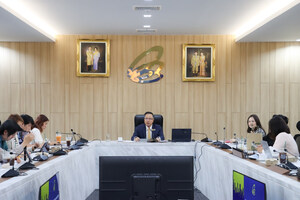Thailand's robotics and automation industry moves forward, public and private sectors join forces to accelerate development
BANGKOK, Jan. 15, 2018 /PRNewswire/ -- On the road towards an advanced economy under the Thailand 4.0 model, the public and private sectors have been making concerted efforts to accelerate the growth and development of the robotics and automation industries and technologies. These efforts focus on human resources development, knowledge enhancement, information sharing and industrial support networks in tandem with tax and non-tax incentives provided through the Thailand Board of Investment (BOI).
Logo - https://mma.prnewswire.com/media/628540/BOI_logo.jpg
Speaking to more than 300 participants at a recent seminar on "Driving Thai Economic Development through the Automation and Robotics Industry," Chokdee Kaewsaeng, BOI's Deputy Secretary General, explained that the government paid attention to both the demand and supply sides in designing effective investment incentives so as to create the right financial ecosystem in the Kingdom. Such incentive packages are offered for both existing and new investment projects.
On the supply side, BOI's investment incentives are offered to a wide range of business activities related to the robotics and automation industries and technologies: conceptual design solutions; engineering designs and system integration methods to control system configurations; procurement and manufacturing; as well as assembly, installation and commissioning.
Supporting industries eligible for incentive packages include the production of telecommunication equipment and parts; the operation of electronic controls and measurements for industry, agriculture and medicine; the manufacturing of vehicular and scientific tools; the installation of security control systems; and the engineering of high-value software solutions. Incentives provided to these businesses include exemptions of import duties on machinery as well as corporate income taxes, depending on the types of businesses and other incentives involved.
On the demand side, incentives are afforded to both new investment projects and existing investments aimed at increasing current production efficiencies. The incentives range from a waiving of corporate income taxes for three years on the current revenues of an existing project as well as exemptions of import duties on machinery when the tax exemption cap does not exceed 50 per cent of the investment capital. In case of at least 30 per cent of the total investment capital has been made on local automation systems, corporate income tax exemptions will be expanded to 100 per cent of the investment capital. In addition, investors will be eligible for other incentives depending on their respective industry.
At the same time, other parties are engaged in the nurturing of relevant skills and capacities in order to support a wide-scale adoption of robotics and automation technologies across the nation.
The Institute of Field Robotics (FIBO) at King Mongkut's University of Technology, in Thonburi, has been offering courses on industrial robotics and automation systems. Teaching methods have been revamped in order to make them more efficient. Instead of offering only in-class lectures, the university is working closely with potential employers so as to offer opportunities for students to work and learn in real-world business environments through joint-apprenticeship programs. Similarly, newly designed courses enable students to better understand the relationships between different areas of study with the aim of helping them integrate knowledge and learning more holistically. At the end of their studies, students will be able to create industrial robots and automation systems that work well in real-world settings.
Dr. Varin Rodphothong, from the Centre of Robotics Excellence (CoRE) at the Thai-German Institute, has welcomed these concerted efforts made by both the public and private sectors. "Without using robots, it is forecast that 85 per cent of domestic industries will lose their competitiveness in five years and 53 per cent of SMEs may have to shut down," Dr. Varin notes. "The cooperation between the public and private sectors in encouraging the demand for and increasing the supply of robotics and automation systems will increase the overall productivity of Thai industry by 50 per cent with 200 billion baht worth of investment expected in the next five years," the expert adds. "More importantly, the country will reduce its imports of industrial robots and automation systems by 30 per cent. By 2026 Thailand will become an exporter of robots and automation system, we hope."
To support this transformative project, CoRE is aiding both manufacturers and users in four major areas: system integration (SI) certification; human resource development; consultant and technology transfers; and industrial prototype development and testing.
On the private sector side, suppliers and developers of industrial robots and automation systems have joined forces to develop their own industries. To that end, a large number of associations, institutes and communities have been set up, including the Thai Automation and Robotics Association (TARA) and the Thai Robotics Society.
Mr. Narakorn Ratchapolsitte, Vice President of the Thai Automation and Robotics Association, has said that the diversity of TARA members provides the association with a high capability to help robotics and automation system companies find the best solutions for their businesses and their customers alike. "TARA's survey has shown that in the next one-three years, 50 per cent of Thai industry will have more readiness to adopt automation systems," Narakorn explains. "In the short term, large companies are ready to go automated while small companies will need more than 5 years to become automated. This means the trend for industrial robots and automated systems in Thailand is strong and well-established."
He adds: "The future is bright and it's already here."
For more information, please contact:
Thailand Board of Investment
Email: [email protected]
Tel. +66 (0) 2553 8111
Website: www.boi.go.th






Share this article